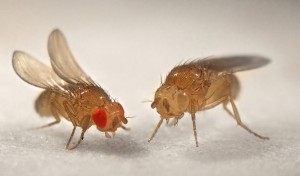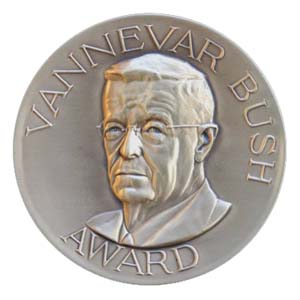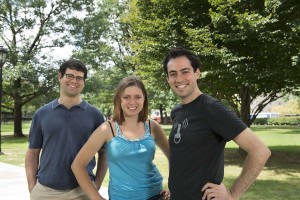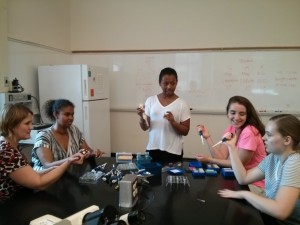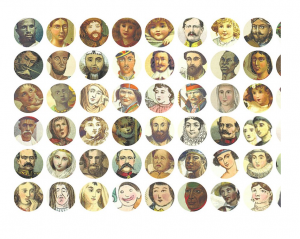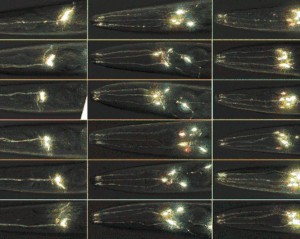Enter your address to receive notifications about new posts to your email.
-
Undergrads open their eyes to flies
In 2014, six undergraduate researchers received Victoria Finnerty Undergraduate Travel Awards, supporting their travel to GSA’s Annual Drosophila Research Conference to present their work. These recipients were among nearly 200 undergraduate students attending the 56th Annual Drosophila Research Conference from March 4-8, 2015, in Chicago, Illinois, providing a robust undergraduate population in a welcoming community…
-
National Science Board seeks nominations for Vannevar Bush Award
The National Science Board is seeking nominations for its Vannevar Bush Award, which “honors truly exceptional lifelong leaders in science and technology who have made substantial contributions to the welfare of the Nation through public service activities in science, technology, and public policy.” According to the award website, candidates for the Vannevar Bush Award should…
-
Celebrate National Postdoc Appreciation Week
GSA encourages the members of our community to join with their colleagues around the country to celebrate National Postdoc Appreciation Week (NPAW). This sixth annual event, sponsored by the National Postdoctoral Association (NPA), recognizes the significant contributions that postdoctoral scholars make to research and discovery. In 2010, NPAW was officially recognized by the U.S. House…
-
Read/write access to your genomes? Using the past to jump to the future
Today’s guest author is Razib Khan, who is currently a graduate student in genomics at UC Davis. Outside of his scientific work he is interested in history, religion and philosophy, among other things. You can follow him on Twitter at https://twitter.com/razibkhan. If the story of the last century was the maturation of physical science, the plot of the coming…
-
Exome sequencing: Giving researchers more bang for their buck
Over the last decade, advances in next-generation sequencing technology have given rise to many findings increasing our understanding of human disease and natural variation within species. Sequencing of the exome, the small fraction of the genome encompassing all exons of protein coding genes, has gained popularity as an inexpensive alternative to sequencing the entire genome.…
-
New Faculty Profile: Krista Dobi
This is the first in a series of profiles of GSA members who are establishing their first independent labs. If you’d like to be considered for a profile, please complete this form on the GSA website. Krista Dobi Assistant Professor, Natural Sciences Department Baruch College, City University of New York Research program: My lab uses…
-
Biocurators: Behind the Data
Today’s guest post was contributed by Maria Costanzo of Stanford University. She has been a biocurator since before the term was coined and has contributed to genome database projects for a variety of fungi. The views expressed are her own. Follow her on Twitter: @mariaccostanzo. When someone asks what I do for a living,…
-
DIY Public Communication Training
Today’s guest post is contributed by Jesse Dunietz, co-founder of Public Communication for Researchers (PCR), and PhD student in the Department of Computer Science, Carnegie Mellon University. You could be forgiven for thinking that a talk titled “Is there a war on science in the US?” would be a bit of a downer. But for…
-
Turning Science Students into Science Teachers
At the Gordon Conference on Undergraduate Biology Education Research in July 2015, Meg Bentley (American University) presented data demonstrating the effectiveness of an Undergraduate Teaching Assistant (UTA) program. Genes to Genomes asked her to give us some advice on the development and execution of such a program. Imagine a biology lab in which students work in…
-
Human Genetic Diversity and Social Inequalities
As ancient humans spread across the globe from their evolutionary birthplace in Africa, they tended to lose a little genetic diversity at each step along the way. New settlements were probably often founded by small groups that carried only a subset of the total diversity present in their homelands. Successive rounds of this “founder effect”…
-
New in GENETICS!
Check out the September issue of GENETICS! Investigations METHODS, TECHNOLOGY, AND RESOURCES A Male-Specific Genetic Map of the Microcrustacean Daphnia pulex Based on Single-Sperm Whole-Genome Sequencing Xu, Sen, Matthew S. Ackerman, Hongan Long, Lydia Bright, Ken Spitze, Jordan S. Ramsdell, W. Kelley Thomas, and Michael Lynch Abstract|Full Text|Full Text (PDF)|Supporting Information HIGHLIGHTED ARTICLE Computer-Assisted Transgenesis of Caenorhabditis elegans for Deep…


